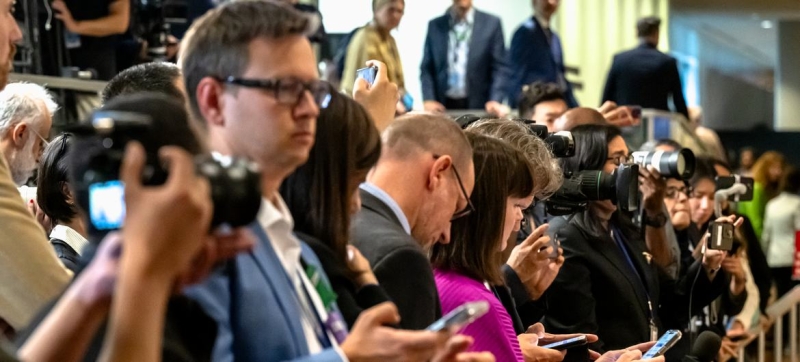
“Journalists who tell people the truth and expose the terrible nature of armed conflicts are the true defenders of human rights.” The world marks the International Day to End Impunity for Crimes against Journalists Peace and Security
In 2022-2023, UNESCO recorded 162 murders of journalists, media workers and social media content producers. This is 38 percent more than in the previous two-year period. This is stated in the report “Journalists on the Frontlines of Crises and Emergencies”, published by UNESCO ahead of the International Day to End Impunity for Crimes against Journalists, which is marked on 2 November.
The increase in the number of journalist murders, the authors of the report point out, is partly due to the increase in the number of deaths of media workers in countries where armed conflicts are ongoing. But outside these states, there was also a significant surge in the killings of journalists in 2022 – 60 incidents, which is the highest figure in the history of UNESCO. According to the organization, Latin America and the Caribbean remains the region with the highest number of journalists killed.
The UN General Assembly adopted resolution 68/163, which decided to proclaim 2 November as the International Day to End Impunity for Crimes against Journalists, in 2013. The resolution urges Member States to take concrete measures to combat impunity. The date was chosen in memory of two French journalists killed in Mali on 2 November 2013.
Impunity Breeds Violence
“Globally, an estimated 9 out of 10 journalists killed go unpunished, and impunity breeds further violence,” the UN Secretary-General said in a message. “The Pact for the Future, adopted last month, calls for the respect and protection of journalists, media workers and associated personnel working in armed conflict. I call on governments to translate these commitments into action by taking urgent action to protect journalists, investigate crimes against them and prosecute those responsible.”
More than 1,700 journalists were killed worldwide between 2006 and 2024. Ending impunity for crimes against media workers is essential to ensuring freedom of expression and universal access to information.
Journalists who tell the truth and expose armed conflict are the true defenders of human rights. The UN High Commissioner for Human Rights, Volker Türk, stated this in his message. According to him, attacks on journalists undermine freedom of expression and deprive society of critical information.
Threats against women journalists
The murders of journalists are the most extreme form of media censorship, but media workers are also subject to countless threats, especially in the digital sphere. Such threats, as well as attacks on journalists, create an atmosphere of fear, preventing the free flow of information, opinions and ideas.
Women working in the media are particularly vulnerable to threats and attacks. According to a recent UNESCO document, Global Trends in Online Violence against Women Journalists, 73 percent of women journalists surveyed said they had been subjected to threats, intimidation and abuse online in connection with their work.
